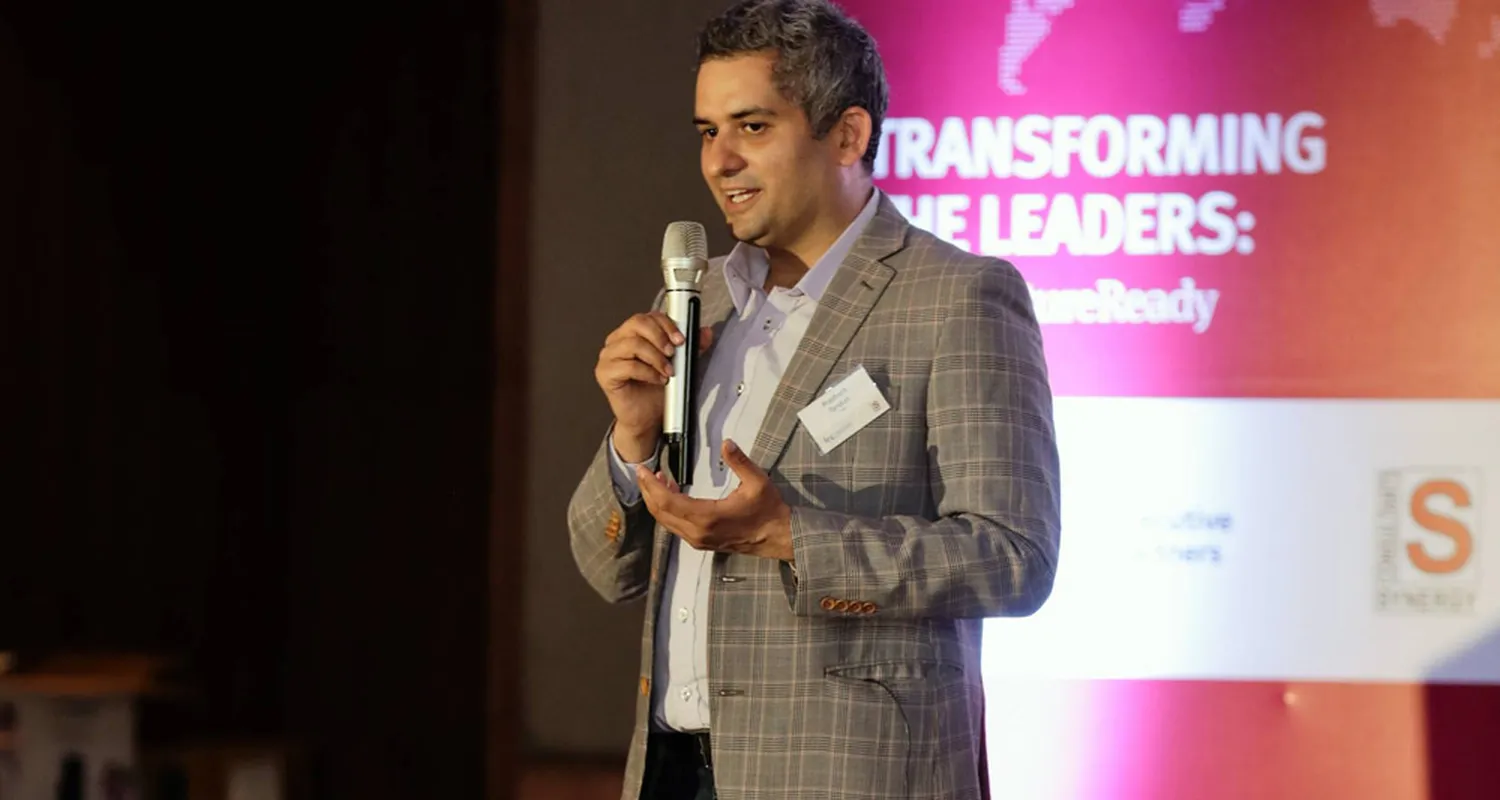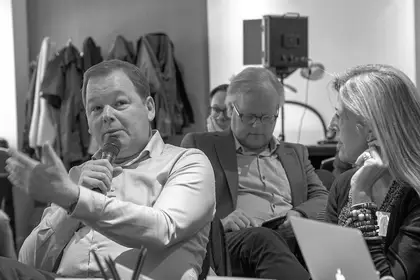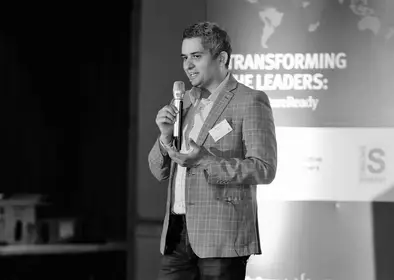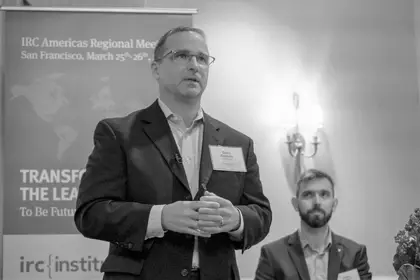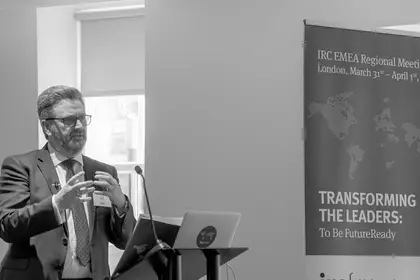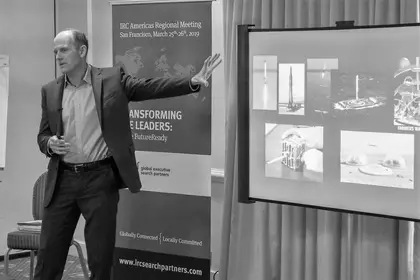Executive Summary
Future-ready leaders:
- Lead with Integrity, Values and Vision: lead by example, aligning personal and organisational values and transferring their vision, enthusiasm and commitment to every member of their team.
- Champion Transparency, Communication and Technology: defend transparency, communicate honestly and clearly and leverage technology to improve communications and optimize business processes.
- Foster an Inclusive and Innovative Culture: create an inclusive and innovative culture that serves to attract and retain diverse expertise and promotes risk-taking and innovation.
- Cultivate Knowledge and Promote Lifelong Learning: invest in professional development for themselves and their teams and exploit mentorship and coaching opportunities within their organisations.
- Embrace Complexity and Mitigate Risks: take on volatility, uncertainty, complexity and ambiguity by correctly diagnosing each situation and prescribing the appropriate action.
The list of distinguished delegates and speakers who gathered in the outskirts of New Delhi for the Kestria APAC Summit included 1mg Technologies CEO Prashant Tandon, who championed simplicity as a guiding principle for business processes and innovation. Delegates brainstormed and formed a consensus on what it takes to excel in a world of growing complexity, how to develop resilient teams, anticipate future knowledge needs and transform organisations to be future-ready.
At the Kestria EMEA Regional Meeting in London, delegates offered guidance on how to align individual and organisational values, make leaders “future-fit” and organisations “future-ready”. David Haley, Senior Vice President at global outsourcing services provider Atos, emphasised the need to develop talent and leverage technology to prepare for a more competitive and complex future.
The Kestria Americas Summit in San Francisco featured Harvest Time Partners Founder David Esposito, who described specific tools that enable organisations to become more effective and resilient. Astronaut Steve Smith contributed cosmic perspective, likening a C-Level executive’s exploratory role to the environment of extreme unknowns faced by cutting-edge scientists pushing the limits of human knowledge.
1.
Lead with Integrity, Values and Vision
The three regional Kestria summits drew similar conclusions about future-ready leaders and the character traits they share. Future-fit leaders, all agreed, convey a clear vision and a sense of purpose, supported by personal integrity, enthusiasm and commitment. Future-ready leaders are curious, modest, good listeners and technologically savvy. They are also flexible, compassionate and culturally aware, but most of all, they are loyal to the guiding principles and values of the organisation they represent. They are capable of adapting strategy on the fly to maintain competitiveness and growth in a sea of uncertainty. Customer-facing experience and diplomacy are increasingly important skills of future-ready leaders.
Klaas van de Poppe at the Kestria EMEA C-Suite Summit in London
An organisation’s vision allows it to promulgate its core values alongside the products or services it delivers, “the red dot on the horizon,” Ridder Group CEO Klaas van de Poppe called it at the Kestria EMEA Regional Meeting. Organisations need to set their direction with a long-term vision while remaining nimble to adjust their strategy and fine-tune their course of action to overcome challenges along the way, he said.
Leaders who demonstrate in their everyday conduct that their personal values are aligned with those of the organisation serve to inspire their colleagues to do the same. Values and attitudes change over time, and leaders must stay connected to their teams to ensure the organisation’s values still resonate and employees don’t feel values are being forced on them. Dialogue is a vital part of sharing and transferring values.
Teamwork, mutual respect, innovation and trustworthiness are key guiding principles for any organisation aiming to maintain a high level of preparedness, Harvest Time Partners founder David Esposito told the Kestria Americas C-Suite Summit in San Francisco.
Every member of an organisation, beginning with its leadership, should consider five fundamental questions for the sake of clarity and alignment, Esposito said, namely:
- What is the purpose of the business?
- Why does it matter?
- How do we behave?
- What needs to be done?
- What is my role?
Answering these questions allows every team member to internalise their organisation’s core principles and mission, laying the foundation for its achievement.
2.
Champion Transparency, Open Communication and Appropriate Technology
“Leadership starts with a dream and the effective communication and transfer of that dream,” noted 1mg Technologies CEO Prashant Tandon in conversation with Kestria Global at the APAC Summit.
An organisation’s vision, it’s mission and core values need to be reinforced continuously in internal and external communications. This should begin with the first interaction between a company and a prospective employee, for example, and continue throughout their tenure, to ensure values are aligned.
Future-fit leaders are clear, honest and transparent in their communication with team members, and never attempt to hide the truth. They are also attentive listeners, taking care to include all points of view, including those they oppose.
Prashant Tandon at the Kestria APAC C-Suite Summit in New Delhi
Novel technological tools allow organisations to monitor operations and performance in real-time and respond faster when the strategy needs to be adjusted. Greater visibility of operations and performance inevitably improves transparency. Organisations that embrace and defend transparency, in their business practices, in how employees are selected and compensated and in how their products and services are developed and delivered, are ready for a world in which access to information is considered a right.
Being open and honest encourages acceptance, even when leaders have to communicate difficult decisions or bad news. Communication that helps explain and explore ideas and potential outcomes with the team and external stakeholders encourages buy-in and loyalty.
Open, two-way communication is also critical to ensure diverse employees with diverse mindsets feel that they’re listened to and included. Future-ready leaders champion inclusion and transparency and leverage digital tools that make communication easier and improve visibility of the company’s operations, performance and business environment.
Consumers and employees expect companies to solicit feedback and respond to it quickly. Future-ready leaders connect directly with consumers, as well as with their direct reports, other team members and colleagues, utilising technology appropriately to promote efficiency, build morale and encourage loyalty.
“Understand Your People,” advises Helen Curtis, HR Director at BACB and a delegate at the Kestria EMEA Regional Meeting in London. Curtis urges business leaders to give employees time to think and talk more about what they are trying to achieve and how they are approaching their goals.
Staying connected is essential, and open communication can serve to eradicate misunderstandings and fear within an organisation that might otherwise stifle risk-taking and innovation.
David Esposito at the Kestria Americas C-Suite Summit in San Francisco
When all else fails, “Get out of the office,” said Harvest Time Partners’ David Esposito, “and talk to people.” Leaders need to gain understanding about a business from every perspective, Esposito added. “The view of the game on the field is entirely different from the view from the stands, and both are important,” he added, using a sports analogy.
3.
Foster an Inclusive and Innovative Culture
The best leaders have a knack for attracting diverse, bright minds and unleashing talent to solve well-defined problems. Problem-solving requires promoting innovation and calculated risk-taking as an integral part of the process, and in turn, accepting failure for what it is: a probable outcome and a learning opportunity. Mitigating losses from educational failures is an entrepreneurial skill common to future-ready leaders.
Innovation should start with a simple thought process aimed at “figuring out a better way to do something”, 1mg CEO Prashant Tandon said. People from diverse backgrounds and disciplines are best placed to generate innovative ideas, he added. Notwithstanding the usefulness of teleconferencing, immersive working experiences providing face time between colleagues are invaluable, he said, to encourage alignment with an organisation’s culture and values and to share knowledge. Out-of-the-box thinking helps organisations anticipate changes and channel resources to the innovations that will make them better prepared and more resilient, Tandon said.
Innovation is the product of an entrepreneurial mindset and tireless work ethic typical of start-ups everywhere. Mature companies need to take active steps to promote an entrepreneurial spirit if employees are to feel they have skin in the game and will be rewarded for going the extra mile and thinking outside the box.
4.
Cultivate Knowledge and Promote Lifelong Learning
Gone are the days when leaders needed to pretend to know it all. Future-ready leaders acknowledge what they don’t know, as well as what they know, and surround themselves with experts who have the expertise they lack. At the same time, future-ready leaders recognise they are influencers and lead by example, personally delving into various areas of expertise that could impact the organisation, explained Ridder Group CEO Klaas van de Poppe. Acquiring a baseline of knowledge about emerging technologies allows forward-thinking leaders to speak the same language as entrepreneurs who may prove to be invaluable business partners down the road, he said.
As technological change transforms business processes across industries, future-ready leaders transform themselves and their organisations by retaining knowledgeable experts in the most relevant disciplines and upskilling existing team members to keep them relevant. Professional development for leaders, managers and the broader workforce should be career-long and heavily focused on technical skills.
David Haley, Kestria EMEA C-Suite Summit in London
“Individuals must develop, or they risk being left behind,” agreed Atos Senior Vice President David Haley.
To be future-fit, leaders need to stay abreast of emerging technologies like Big Data, 5G, artificial intelligence and machine learning and know which could benefit customers and their organisation and which should be monitored at arm’s length.
Future-fit leaders are paranoid enough to stay informed, avoid complacency and over-confidence and anticipate disruption, so they aren’t blindsided. Cross-generational mentoring and coaching help ensure employees with varying skill sets and experience levels share knowledge, gain exposure to emerging trends and technologies and “speak the same language” across an organisation.
5.
Embrace Complexity and Mitigate Risks
There’s no doubt today’s global business environment is fraught with Volatility, Uncertainty, Complexity and Ambiguity (VUCA). Characterising the modern world as VUCA is only useful, however, if each situation is properly diagnosed for what it is and the right prescription applied. To confront volatility, companies can invest in agility and stockpile resources, for example. To deal with uncertainty, they can invest in knowledge and new information networks; Complexity can be addressed by adapting the organisational structure to mirror the environment. Prashant Tandon, CEO of 1mg Technologies, encourages companies to deal with complexity by focusing on core activities and outsourcing everything else, for example. A rational approach to ambiguity is experimentation, meanwhile, the first step towards any innovation.
Astronaut Steve Smith presented the Kestria Americas Summit with an analogy between his exploratory work in outer space in an environment full of risks and extreme unknowns, to the qualifications of futuristic leaders on earth. Like business leaders, explorers must deal with dynamic change when crucial information is missing, he noted. Technical skills are critical in these environments, he said, but attitude is every bit as important.
Steve Smith at the Kestria Americas C-Suite Summit in San Francisco
“We start with audacious goals and pursue them relentlessly,” Smith said. When there are setbacks or failures, “We respond immediately. We don’t mope. We innovate quickly, and we come up with timely solutions.”
There’s no one solution to effective future-ready leadership. The best-prepared share several common characteristics, however, including adaptability and resilience and an ability to unite diverse minds under a common vision, instil values and a sense of purpose and propel organisations by taking calculated risks, innovating and accepting failure as an integral part of the process.

